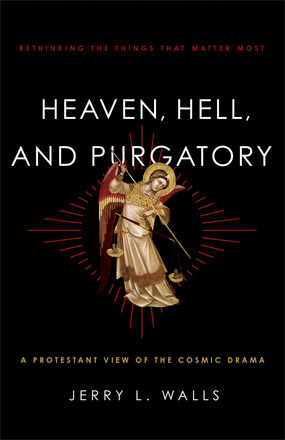| March 17, 2018 |
no comments
 Jerry L. Walls, Heaven, Hell, and Purgatory: Rethinking the Things That Matter Most, A Protestant View of the Cosmic Drama (Grand Rapids, Michigan: Brazos, 2015), 235 pages, ISBN 97815874313566.
Jerry L. Walls, Heaven, Hell, and Purgatory: Rethinking the Things That Matter Most, A Protestant View of the Cosmic Drama (Grand Rapids, Michigan: Brazos, 2015), 235 pages, ISBN 97815874313566.
The volume under review presents a compelling case for a Protestant reception of a literal heaven and hell (not metaphorical torment), and an afterlife, and it reads as a breath of fresh air, especially in a contemporary religious cum cultural climate that tends to sideline or dismiss the aforementioned topic. In eight chapters besides an introduction and a conclusion, the book distills for a popular readership the Houston Baptist University philosopher Jerry Walls’ academic trilogy – Hell: The Logic of Damnation (Notre Dame University Press, 1992) [Editor’s note: read a physicist’s in-depth review], Heaven: The Logic of Eternal Joy (Oxford University Press, 2002), Purgatory: The Logic of Total Transformation (Oxford University Press, 2012). The book under review also examines corollary conversations, such as the intricate relationship between the trinity, the meaning of life, the nature of personal identity, the intricacies of sin and salvation, the problem of evil, the wideness of divine mercy, and the contemporary foundations of moral philosophy behind human decision-making.
God seeks the renewal of the cosmos and for Christ’s glory to be reflected everywhere.
Chapter 1 defends the reality of heaven with seven salient truths. The truths are based upon Walls’ reading of Revelation 19-21. Walls challenges perspectives that pitch the heavenly-minded against the enjoyment of earthly, material life (pp. 40-41). And instead of following Nietzsche to trivialize the body and to devalue the earthly life, Walls argues that because heaven preserves the best of human culture (cf. the cultural mandate at the Genesis creational account; pp. 34-35, 43), believers who love God more and more would also love the world and materiality to an increasingly greater extent (p. 38). In Walls’ reasoning, when Christ offers the gift of salvation, Christ desires more than the liberation of the human soul from the temporal life; God seeks the renewal of the cosmos and for Christ’s glory to be reflected everywhere (p. 39). The theology of salvation cannot be divorced from the theology of creation (p. 32). As the author, the director, the God that empowers, and the source of all that ever exists, the Alpha wants to bring creation to its glorious cosmic end (the word “end” is read as goal). Hence, when humans stay in right relationship with the Alpha, they will anticipate, and not dread, the Omega (pp. 24-25), and accordingly, they will desire heaven, and heaven as on earth.
Heaven is not too good to be true. Heaven is real.
Chapter 2 critiques some philosophical alternatives to the Christian conception of heaven. In particular, Walls rejects Bertrand Russell’s substituted paltry for heaven as the worship of a freed humanity (pp. 48-53). Walls finds Richard Taylor’s analysis that people will follow a life-course that is analogous to the man reported in
Sisyphus, who would roll stones up and down a hill repeatedly and for no meaningful purposes unsatisfying (pp. 55-56). Walls read as absurd, Thomas Nagel’s assertion that humanity will attain greatness in life when God is ironically absent from human lives (p. 57). Walls also finds Keith Parsons’ recommendation pessimistic. Parsons urges people to abandon any presumption that life is only meaningful when life is thought to continue from this temporality into eternity (pp. 59-62). And to Carl Sagan’s atheistic assessment of a wishful heaven, Walls reminds that hoping for heaven will grant true consolation; heaven is not too good to be true or imaginary but it is real (pp. 63-64).
Tags: heaven, jerry, purgatory, walls
Category: In Depth, Winter 2018
 Jerry L. Walls, Heaven, Hell, and Purgatory: Rethinking the Things That Matter Most, A Protestant View of the Cosmic Drama (Grand Rapids, Michigan: Brazos, 2015), 235 pages, ISBN 97815874313566.
Jerry L. Walls, Heaven, Hell, and Purgatory: Rethinking the Things That Matter Most, A Protestant View of the Cosmic Drama (Grand Rapids, Michigan: Brazos, 2015), 235 pages, ISBN 97815874313566. 

